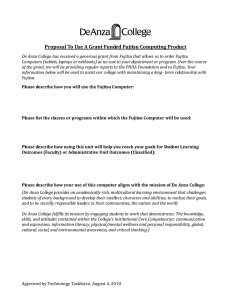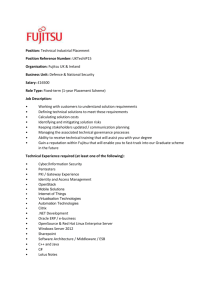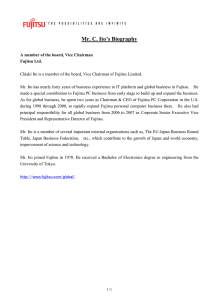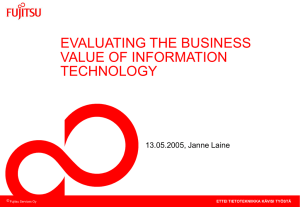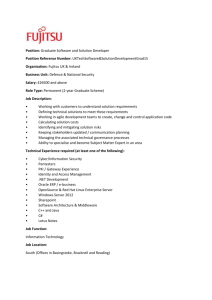Integration of Location Based Services with Mobile Business Processes Management
advertisement
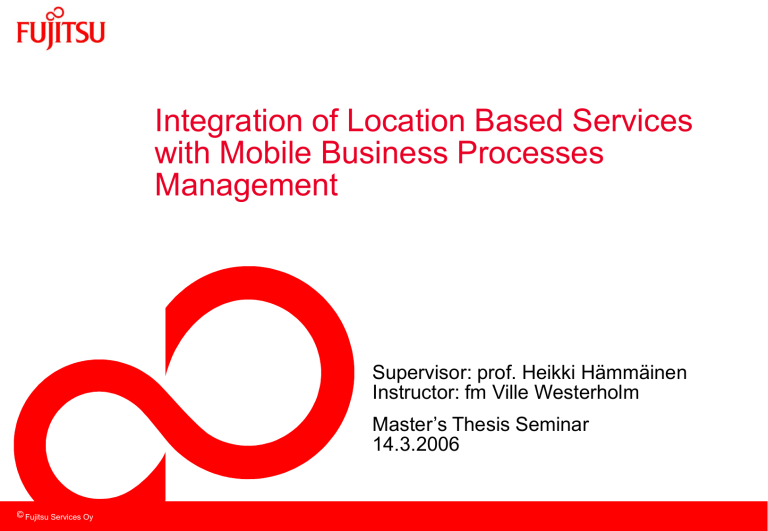
Integration of Location Based Services with Mobile Business Processes Management Supervisor: prof. Heikki Hämmäinen Instructor: fm Ville Westerholm Master’s Thesis Seminar 14.3.2006 Fujitsu Services Oy Agenda Introduction – Background – Location Based Services – Mobile Personnel Management System Research Problem Research Method – Requirements of Integration – Solution Architectures – Pilot Integration Conclusions Fujitsu Services Oy Background In many business areas, such as logistics, the mobility is compulsory Traditionally the business process management has been more or less stationary and therefore mobile field force personnel may have had old or even faulty information of the task Another area of interest, when working with mobile personnel, is location When systems are not integrated, Location Based Services (LBS) cannot offer functionality that would seamlessly support the mobile field force management Fujitsu Services Oy Location Based Services Services, which contain: defining location, location information transporting, and services, which are related to information of mobile device user location Geographic Information System (GIS) studies the geographical information of world’s surface and man-made structures -> Used for digital maps Positioning is location of an object in a specified reference system Navigation is an action that helps finding the specified location based on the user choices Tracking is defined as positioning based functionality that aims for reporting a position of the object in close to real-time fashion and may also contain surveillance of the object Fujitsu Services Oy Mobile Personnel Management System Offers end-to-end solution for mobile workers to be connected to operative processes of enterprises Fujitsu Services Oy Research Problem Required functionality of LBS to support field force management? Architectural design of the integration based on current products? Positioning method that can be used for locating the users? Fujitsu Services Oy Requirements of Integration (1/3) Customer requirements Requirement Navigation Logistics X Special Maps Service X Security X X X X Tracking of other Fujitsu Services Oy X X ‘Automatic’ task starting and ending Assignee tracking Maintenance X X X X X Tracking history (X) (X) X X Route planning X X X X Other real-time applications X Requirements of Integration Functional requirements of LBS – Define Point of Interest – Define User of Interest – Show Map – Solve Coordinates for Address – Solve Address for Coordinates – Define Distance Between Coordinates – Define Driving Distance Between Coordinates – Define Shortest Route – Collect User Location Information – Store User Location Information History – Navigate to Coordinates – Update Maps – Download Special Maps Fujitsu Services Oy (2/3) Requirements of Integration (3/3) Other requirements – Have to meet common requirements set for mobile field force management system Global Support Distinctive Resale Models Scalable Secure Reliable – Requirements that enable fulfilling functionality Adequate positioning Real-Time Tracking Information Fujitsu Services Oy Modules of Integration Tracking Module GIS Database Mobile Tracker Location Server Tracking Database MFFM Module User Database Client Application Task Manager Application Database Mobile Mapping Module Navigation Fujitsu Services Oy Maps Tracking Application Architectural Solution 1 Client Appliance Task Manager MFFM Data Synchronization MFFM Client Task Management MFFM Server Application Database MFFM Data Tracking Connector Navigate To coordinates MFFM Task Mangager Tracking Application Mobile Mapping Positioning API Tracking Handler Request maps with POIs (x,y), UOIs (id), etc… Map Data Location Server Tracking Database Location Services Position Gateway Mobile Tracker Tracking Data GIS Database Maps with UOIs, POIs... Stand-Alone Task Management Fujitsu Services Oy Architectural Solution 2 Navigate To Coord. Signaling Tracking Data Tracking Task Manager Connector MFFM Data Synchronization MFFM Client Mobile Mapping Mobile Tracker Positioning API Task Management MFFM Server Client Appliance Application Database Tracking Database * MFFM Data MFFM Task Mangager Tracking Application Tracking Handler Request maps with POIs (x,y), UOIs (x,y), etc… Location Server Map Data * Interchangeable Fujitsu Services Oy GIS Database Location Services Tracking Database * Maps with UOIs, POIs... Stand-Alone Task Management Comparison of the Solutions Fujitsu Services Oy Feature Solution 1 Solution 2 Location data path Separate form MFFM data path Partly common to MFFM data path Location of the Tracking DB Location server Location server or MFFM server Security Requires 2 different authentications and authorization methods of terminal users Authentication and authorization of terminal users handled in one spot Changes required to MFFM product Few changes in database, logic for handling the POI and UOI requests Changes in database, logic for handling the POI and UOI requests, support for sending location information form MFFM client to server, logic for forwarding the location reports or adding Tracking DB Complexity More simple More complex Ongoing administration work Double administration of terminals and terminal users User and terminal data only once Support for reviewed products Maporama, Indadon, (MapPoint with large restrictions) Maporama, MapPoint General support for distinctive tracking products Worse Better Positioning Methods [http://www.tekes.fi/julkaisut/paikannus_mobiilipalveluissa.pdf] Fujitsu Services Oy Pilot Integration Indagon Leader tracking solution is integrated to Fujitsu mProcess field force management solution Based on architectural solution 1 -> Fast to implement and only one point of integration with mProcess Offers proof of concept Most of the defined functionality was implemented -> Enables evaluation of defined requirements Will be taken to production, after enhancements Fujitsu Services Oy Screen Shots Fujitsu Services Oy Conclusions LBS can be used to enhance mobile personnel management Defined functionality is sufficient, but further research should be done as new requirements emerges GPS positioning is sufficient for most of the use scenarios. For greater accuracy, enhanced GPS or hybrid positioning is required. Based on pilot integration feed-back, it is possible to take the concept to production after some technical enhancements Fujitsu Services Oy Fujitsu Services Oy
